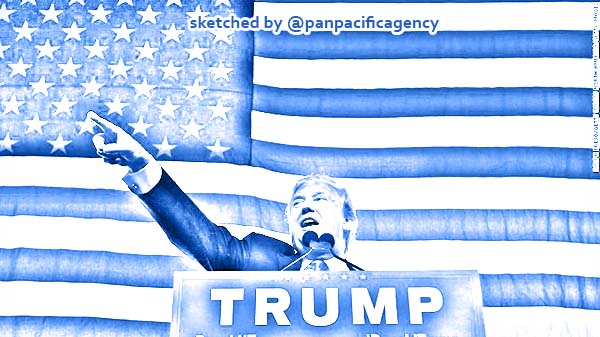[Analytics] Why Donald Trump doesn’t need Facebook

Donald Trump. Photo be the CNN. Sketched by the Pan Pacific Agency.
Last week, Donald Trump got another slap in the face: Facebook announced it was extending its ban on him for two years. In early 2023, the company, which gave Trump the boot after he incited the January 6 attack on the US Capitol, will reassess whether it should allow him to return to its platform and Instagram. David Corn specially for the Mother Jones.
As many a commentator observed, this move will blunt Trump’s ability to throw around his social media weight during the coming campaign. “Facebook’s action means he will be muted from the mainstream platforms during at least the 2022 midterm election cycle,” the New York Times noted. This news, especially occurring in the wake of Trump pulling the plug on an unsuccessful blog that he had started a few weeks earlier, did seem to suggest a decline in Trumpian power. But even without access to mainstream social media, Trump still will inhabit a supersized role in Republican—and American—politics because of two important factors: money and fear.
Let’s start with the bottom line. No one in the GOP can raise cash like Trump. Even in defeat (or perhaps because of it). It can often be hard to pin down comprehensive numbers when it comes to political fundraising, but in the weeks after the 2020 election Trump Hoovered up a large amount of campaign cash, mainly in small donations from his ardent devotees. From November 24 until the end of the year, his Make America Great Again political action committee drew in $62.6 million, as Trump was pushing the Big Lie that the election had been rigged against him. In this period, the Republican National Committee, with Trump’s help, pulled in $18.8 million. That’s more than $80 million in five weeks, suggesting the total haul for Trump and the Republicans for the post-election period last year likely surpassed $100 million.
And Trump’s cash-collecting hasn’t eased. In April, it was reported that his Save America PAC, another Trump campaign-cash-grabber, had $85 million in the bank—about ten times the amount of campaign funds he possessed four years ago. This indicated Trump had raised tens of millions of dollars in the first months of 2021. (This PAC reported $31 million cash on hand at the end of 2020.) The money train did not stop with Trump out of office. His funding operation is unrelenting and presumably runs on email lists that include millions—or tens of millions—of names.
This fortune shows that Trump remains the center of gravity for the GOP. He has a hold on its supporters’ (paranoid) imagination—two-thirds of Republicans believe his Big Lie and reject President Joe Biden’s legitimacy—and the party’s most precious resource: money. With these funds, he can keep other Republicans from entering the 2024 race (should he want to try to regain the White House). And his demonstrated ability to be the Number One ATM for the party—he has the potential to raise hundreds of millions of dollars by the 2022 midterm elections—will dissuade many Republicans from distancing themselves from Trump. They need him and his fundraising might.
Moreover, Trump can finance whatever political agenda he seeks to pursue—especially the acts of vengeance he has vowed against those few Republicans who voted to impeach him in January for his role in the assault on the Capitol. On Monday, he accused Sen. Lisa Murkowski, who was one of the seven GOP senators who voted to convict Trump in his second impeachment trial, of betraying her state of Alaska and declared, “I think she will be met very harshly by the Alaska voters in 15 months, and I will be there to campaign against her!” And with this growing mountain of money, Trump can do much to influence Republican primary contests in which a Trumpy R is challenging a not-so-Trumpy R. He might not be able to zap angry messages to his followers through Facebook, Instagram, and Twitter (where he also remains banned), but with this large bundle of money, he can thoroughly finance efforts that target his foes and reward his loyalists. Perhaps this won’t be as satisfying for Trump as fuming and venting in short syntax-challenged messages. But it could be more effective.
This brings us to fear. The Republican leadership remains damn scared of Trump because he continues to have the base of the party in his grip. Though the Republican Party is at a historic low in terms of people who identify as Rs—only 23 percent, per a recent Pew Research poll—those Rs still in the party are overwhelmingly Trumpers. That preserves tremendous sway for Trump. Republicans who confront him do so at the risk of backlash from the party’s most faithful voters. Look at how Sen. Mitch McConnell and Rep. Kevin McCarthy, the two top Republicans in Congress, initially excoriated Trump for the January 6 raid and shortly turned tail, dropping their criticism of him and even opposing the formation of a bipartisan independent commission to investigate that horrific attack. They saw that Trump, even out of office, was still embraced by Republican voters and remained the dark soul of their party.